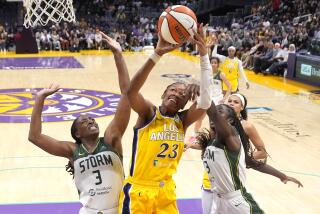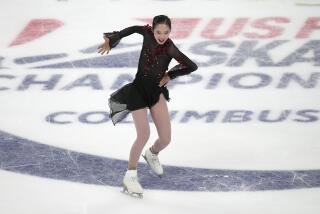Christopher Dean Eyes Pro Skatersâ Union
Always one of figure skatingâs most progressive thinkers, Christopher Dean would like to see a new order in the professional ranks. Make that any kind of order.
Dean, who along with Jayne Torvill forms the most popular ice dance couple in skating history, always has stretched the boundaries of his sport. The pairâs 1984 Olympic free dance to Ravelâs âBoleroâ remains as innovative and provocative as the event can get. While hardly considered rebels, Torvill and Dean continually push for more freedom on the ice.
Now, Dean would like to get the pro skaters together to form an association similar to what the menâs tennis players have with the Assn. of Tennis Professionals. Heâs even held fact-gathering meetings with people who were involved with the development of the ATP.
While he is thrilled that skating competitions and made-for-television shows have sprouted all over the globe, meaning more money for skaters, Dean warns that a bit more organization would be wise.
âIt is something weâve been thinking about over the last year,â Dean said. âWhen you turn professional from amateur-eligible skating, you go into a void of uncertainty about events. You tend to get into those events on the success you had as an amateur. And there isnât a legitimate pro championship that everyone has the right to compete in. And there isnât anything organized by the professional skaters themselves.
âWe have been having talks and are starting to get out the word that we think we have the right to our own championships and association or affiliation that runs a series of events by the skaters for the skaters.
âBecause we are quite a small group of individuals, and a lot of air time is spent on this certain group of individuals, if we came together to form our own association as a collective and put rules together, I think we would be quite a strong force of being able to start up our own professional skating association.â
While things have been disjointed for several years on the professional level, a three-part series is in place this year. Dick Button, the 1948 and â52 Olympic champion and pioneer of pro skating, is producing the Canadian Professional Championship in Ottawa, the U.S. Professional Championship in Albany, N.Y., and the World Professional Championship in Landover, Md. The series is worth more than $1 million, with a fourth event in Europe in the planning stages.
Although he welcomes all comers to pro skating, Button isnât so sure the skaters need a union.
âI hope our series someday will be larger, but whatever develops for skaters, I am in favor of,â said Button, who had to invent the professional level in the 1950s just so he could keep skating and earn a living. âThey should have as many opportunities as they can possibly utilize.
âIt is all seeking its own level and progression. It has become very clear there is some organization in the pro world and it should continue to grow and solidify.
âIf an association is needed, I am sure it will be created. But there is a very big difference in the worlds of tennis and skating. Skating is a subjective sport and the personalities are terribly important, even if those personalities donât always win.â
So many of those personalities are professionals--from T&D; to Scott Hamilton to Kristi Yamaguchi to Brian Boitano to Katarina Witt--that promoters have been doing triple axels to sign them for all kinds of events. Some are serious competitions, such as Buttonâs series. Others, like Fox Televisionâs Rock ânâ Roll Skating Championships, are developed solely as entertainment projects.
While some events have meaning, others have only money as an enticement. There are various rules and scoring systems. The skaters are stuck trying to figure out where to go and when, and arenât always sure what format theyâll find when they get there.
âThere are a lot of different events and different rules and regulations specific for each event, which is fine,â Dean said. âI think the difference is kind of a good thing, too.
âBut we also think there should be one series that everybody understands that we can come together and organize our own rules that we think are important. As professionals, we need to be thinking about longevity, that youâve earned your name and want to sustain it . . . so that it is not about attrition and people coming in and going out, necessarily. Youâre talking about coming in to pro skating to stay in for a while.
âSo you have got to consider how you want to determine what the event is about. Is it about as many rotations and triples? Or are we talking about other things that go into the sport?â
Hamilton attempted such an undertaking a dozen years ago. The 1984 Olympic champion was part of a meeting in which an association for pro skaters was the primary topic. The idea didnât get very far.
âEvery promoter has different ideas of what good skating is and how it should be judged,â he said. âI tried to get the skaters together to find what are the rules we prefer, what is the judging going to be based on. Every promoter has an idea on how they want to run their competitions. But we want it to be right, so it is the skaters who know what they should be doing.
âWe got into a meeting and were trying to come up with what develops the sport and is best for the sport and the skaters, and to make sure we know exactly what to expect when we go to a competition. The skaters were pretty excited about that.â
However, Hamilton found it was hard to reach a consensus.
âThey all have their own needs and schedules and external pressures,â he said. âIt takes the right situation and group of athletes all committed to the same goal.â
And it takes time. It isnât likely to happen soon, and Dean understands that. But he thinks it will happen.
âWe are silly if we canât come together as a group to be able to do that,â Dean said. âI think we should consider it as part of the future and the heritage of what may go on from here . . . a legacy.â
More to Read
Go beyond the scoreboard
Get the latest on L.A.'s teams in the daily Sports Report newsletter.
You may occasionally receive promotional content from the Los Angeles Times.






